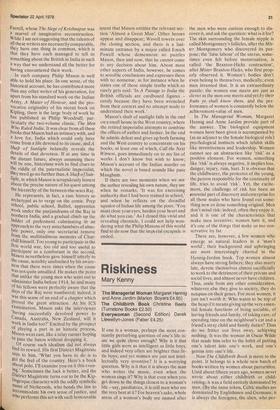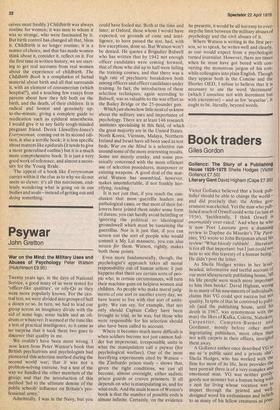Riskiness
Mary Kenny
The Managerial Woman Margaret Hennig and Anne Jardim (Marion Boyars £4.95) The Childbirth Book Christine Beels (Tumstone Books £2.50) Everywoman (Second Edition) Derek Liewellyn-Jones (Faber £4.25)
If one is a woman, perhaps the most constantly perturbing question of one's life is: are we quite clever enough? Why is it that little girls seem as intelligent as little boys, and indeed very often are brighter than little boys; and yet women are just not intellectually very inventive? It is a worrying question. Why is it that it is always the man who writes the music, even when the woman sings it? Why is that even when you get down to the things closest to a woman's life — say, paediatrics, it is still men who are the very best at it? For heaven's sake, whole areas of a woman's body are named after the men who were curious enough to discover it, and ask the question: what is it for? The skin surrounding the female nipple is called Montgomery's follicles, after the Mister Montgomery who discovered its purpose; the 'false labour' of the uterus, sometimes even felt before menstruation, is called 'the Braxton-Hicks contraction', after Mister Braxton-Hicks, who first properly observed it. Women's bodies don't even belong to themselves, medically; even men invented that. It is an extraordinary puzzle: the women one meets are just as clever as the men one meets and yet by their fruits ye shall know them, and the performance of women is constantly below the achievement-value of men.
In The Managerial Woman, Margaret Hennig and Anne Jardim provide part of the answer. The biological equipment women have been given is accompanied by (as an adjunct to the female biological role) psychological instincts which inhibit skills like inventiveness and leadership. Women cannot see an abstraction like 'risk' as a positive element. For women, something like 'risk' is always negative, it implies loss, danger, injury, ruin, hurt. It is obvious that the childbearer, the protector of the young, thel3erson responsible for the continuity of life, tries to avoid 'risk'. Yet, the excitement, the challenge of risk has been an essential part of discovery and enterprise for
all those males who have found out some thing new or done something original. Men don't mind risk; indeed, often they enjoy it, and it is one of the characteristics that make men inventive; women hate it, and it's one of the things that make us too con servative by far.
There are, however, a few women who emerge as natural leaders in a `man's world'; their background and upbringing are most interestingly charted in the Hennig-Jardim book. Top women almost always have strong fathers; they also marry late, devote themselves almost sacrificially to work to the detriment of their private and social lives, and almost never have children. Thus, aside from any other consideration, whatever else they give to society, they do not.pass on their genes. For most women, it just isn't worth it. Who wants to be top of the heap if it means giving up the very essential female functions of being sociable, of having friends and family, of taking care, of spending time on the neighbour's cat and a friend's stray child and family duties? Thus do we fritter our lives away, achieving nothing. It was the woman in Oscar Wilde that made him refer to the habit of putting one's talent into one's work, and one's genius into one's life.
Now The Childbirth Book is more to the point. It belongs to a whole new batch of books written by women about parturition. Until about fifteen years ago, women never wrote about either childbirth or childraising; it was a field entirely dominated by men. (By the game token, Celtic studies are dominated by Englishmen and Germans; it is always the foreigner, the alien, who per ceives most freshly,) Childbirth was always routine for women; it was men to whom it was so strange, who were fascinated by it. But birth control has changed all that, bless it. Childbirth is no longer routine; it is a matter of choice, and that has made women think about it, consider it, reflect on it. For the first time in written history, we are starting to get real accounts from real women about the experience of childbirth. The Childbirth Book is a compilation of factual material about birth and all that surrounds it, with an element of consumerism (which hospital?), and a touching few essays from parents about how they felt both on the birth, and the death, of their children. It is radical and honest and genuinely upto-the-minute, giving a complete guide to medication such as epidural anaesthesia. I would give it to any fairly tough-minded pregnant friend. Derek Llewellyn-Jones's Everywoman, coming out in its second edition, is also a terrific book; it is less specific about matters like epidurals (it tends to give a more generalised outline) but it is a much more comprehensive book. It is just a very good work of reference, and almost a necessity for the Young Bride.
The appeal of a book like Everywoman carries within it the clue as to why we do not seem so clever: it's all this narcissism, endlessly wondering what is going on in our bodies and souls instead of getting out and doing something.



































 Previous page
Previous page